It isn’t often that I can stay locked on to a bird in flight for this many images after takeoff.
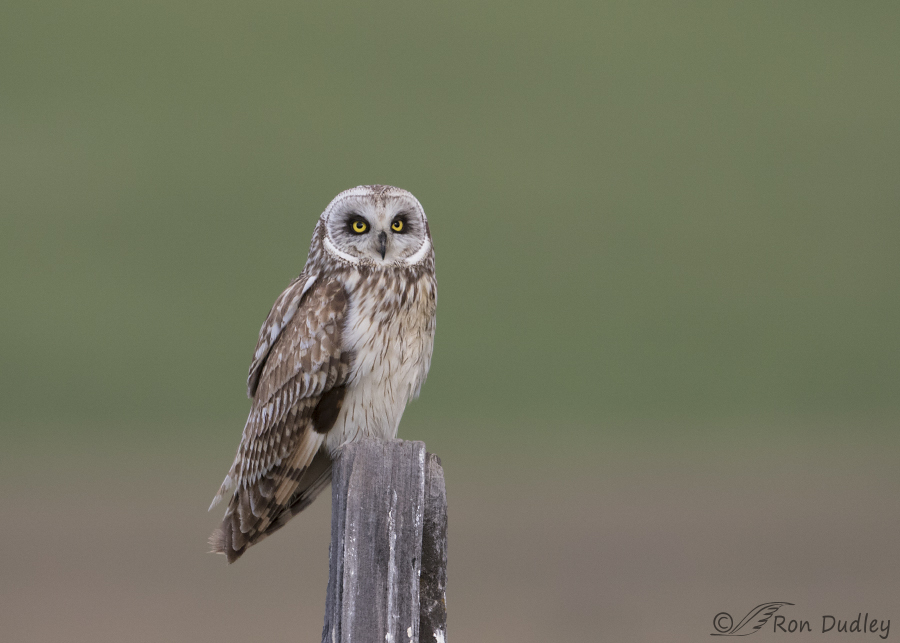
1/2500, f/5, ISO 1250, Canon 7D Mark II, Canon EF 500mm f/4L IS II USM, not baited, set up or called in
Just over two weeks ago I spent quite a while with this Short-eared Owl as it hunted from an old fence post in northern Utah. Several times it took off after voles in the grass, missed them, and then returned to the same post or another one a few feet away.
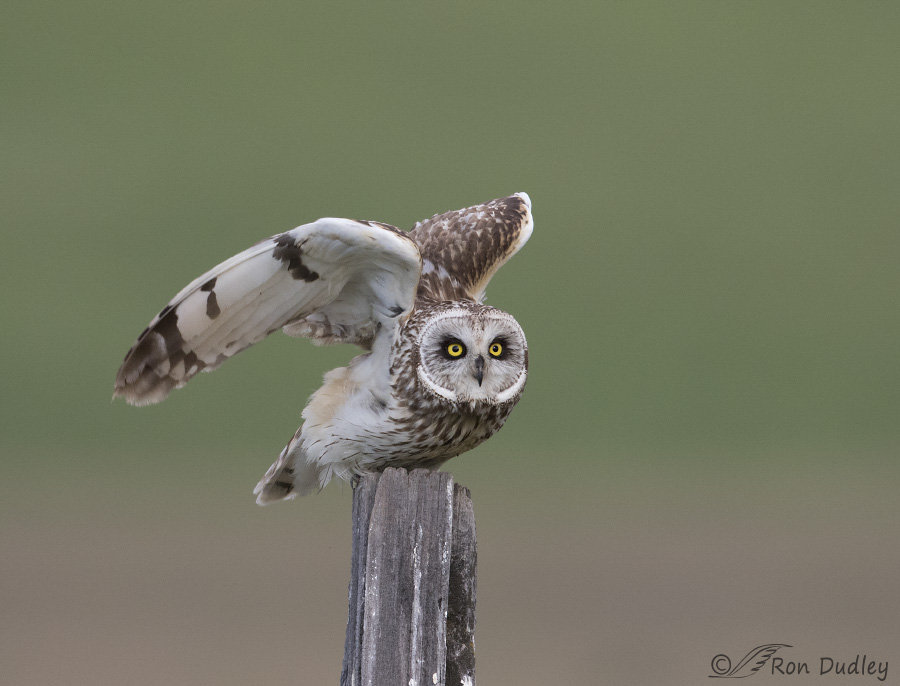
1/3200, f/5, ISO 1250, Canon 7D Mark II, Canon EF 500mm f/4L IS II USM, not baited, set up or called in
This time it spotted prey in the vegetation across the road I was shooting from (as usual I was in my pickup) so it took off…
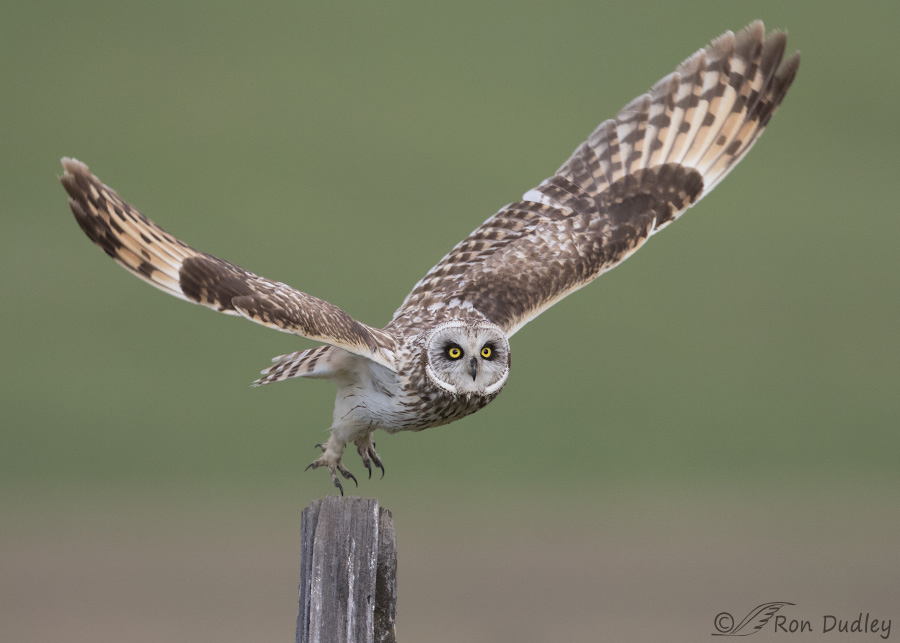
1/3200, f/5, ISO 1250, Canon 7D Mark II, Canon EF 500mm f/4L IS II USM, not baited, set up or called in
almost directly toward me. This is the only image in the series that I’ve posted previously.
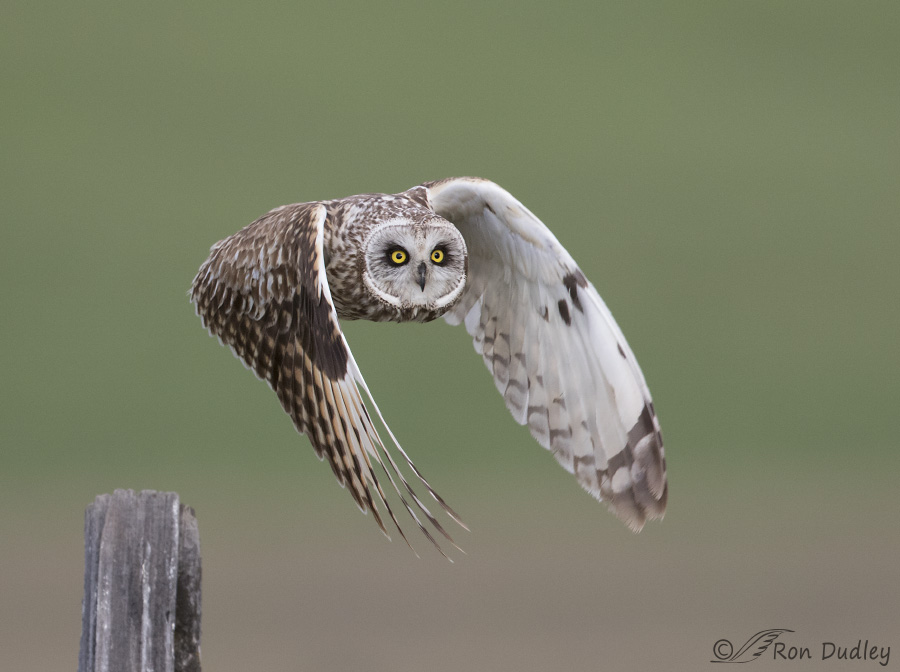
1/3200, f/5, ISO 1250, Canon 7D Mark II, Canon EF 500mm f/4L IS II USM, not baited, set up or called in
I like this next shot in the series because the flight posture of the owl is just a little bit different. Though I stayed locked on to the owl for the next two shots I clipped wings in both of them so I haven’t included them.
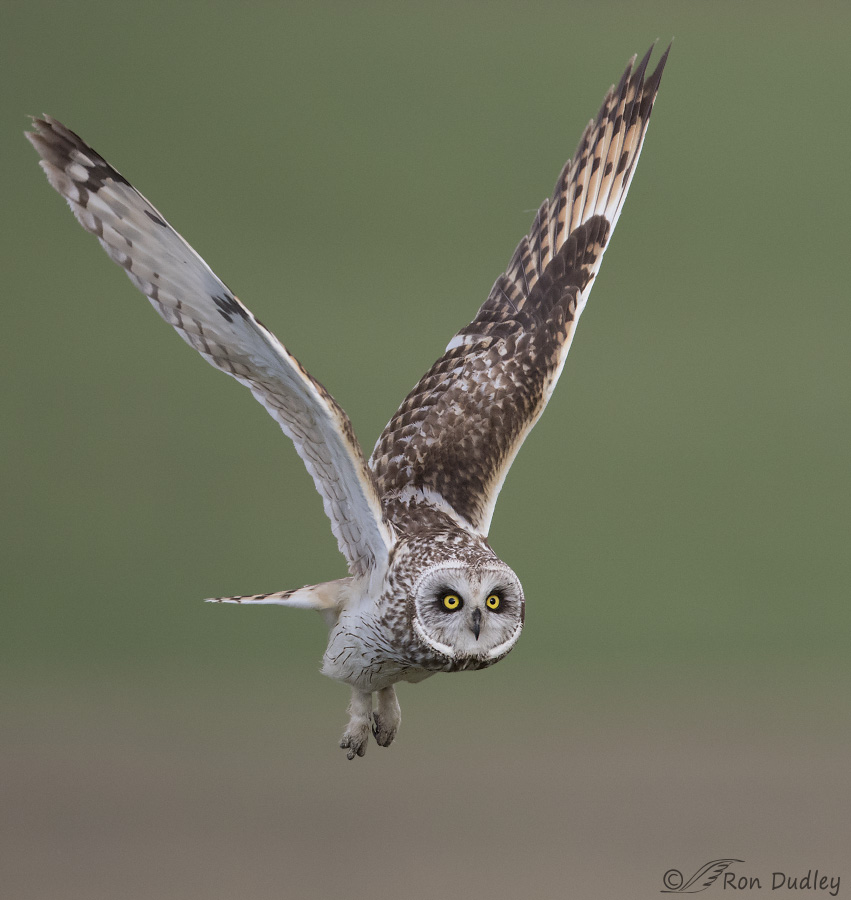
1/3200, f/5, ISO 1250, Canon 7D Mark II, Canon EF 500mm f/4L IS II USM, not baited, set up or called in
Notice that the focus of the owl isn’t on me. That focus is slightly to my right because a direct line of sight from the bird to the intended prey goes right over the top of the hood of my pickup.
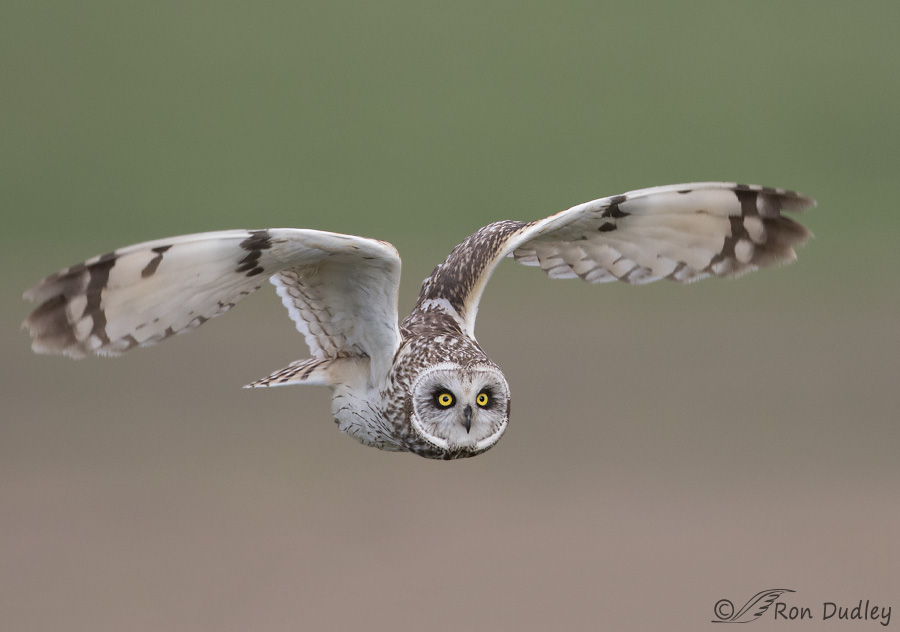
1/3200, f/5, ISO 1250, Canon 7D Mark II, Canon EF 500mm f/4L IS II USM, canvas added for composition, not baited, set up or called in
And that’s exactly the flight path the owl took. After this shot I got two more relatively sharp photos but I clipped wings in both of them. Then I took my eye from the viewfinder and watched through my windshield as the owl flew right over the hood of my pickup and pounced on something in the grasses perhaps 75′ to my right. I was unable to determine if it actually captured the prey or not.
I’m quite happy with this series. It isn’t easy to keep focus lock on a bird approaching rapidly head-on (especially in low light like this – note my ISO) and my 7D Mark II did a good job of it. While I lament the clipped wings in four of the images I was able to get four sharp, unclipped shots after liftoff as the owl approached me.
That’s better than I usually do.
Ron
Note: Photographers often want to know if I’ve used noise reduction when I shoot at such high ISO’s as this. I rarely use noise reduction and I haven’t here.


What a beautiful start to a busy day you have given me.
Love, love, love owls. And this is a stunner. A co-operative stunner.
Even if that co-operation was because it had its eye on the prize…
Ha, I’m not concerned about their motivation as long as they cooperate, EC! Thank you.
Very beautiful. I greatly enjoy your photos and blog while stuck at home. I hope to get out this weekend despite the weather, but so far we have had so many birds dropped off to us it is hard to get out. Yesterday it was 4 baby kestrels, their tree was cut down, and a beautiful juvenile redtail with a wing issue.
“Yesterday it was 4 baby kestrels, their tree was cut down”
Dammit, I hate to hear that, April. When will people learn?…
Been away for a bit – just coming back to these owl shots where the owl is using your truck as a blind!! VBG!
Great shots, never have seen better. Does this post mean you are back from your trip?
Thanks, Dick. Yup, I got back a few days ago. These trips exhaust me (getting old ya know…) so it takes me a few days to recover. I still have lots of image culling and other catching up to do. I just now finished weeding the vegetable garden so now I’m exhausted again…
Don’t feel bad Ron, you are doing fine.
I turn 80 on the 26th of this month, and as long as I get up each day on the right side of the grass I feel I’m doing good!!
Thanks yet again for another spectacular series, Ron! Pity the vole whose last moments are filled with the intensity of those yellow eyes!
Believe it or not I actually think of those voles with empathy, Diane. I’ve seen (and photographed) up close what happens to them after they’re caught. Thankfully it’s usually over quickly and occasionally they use their little, but powerful, rodent teeth to exact some pretty painful revenge just before their demise :).
Ron: Great and hard to achieve shots. Thanks also for your helpful technical tips.
I’m glad to know that some of the technical info I include in my posts is helpful. Thanks for that feedback, Ricardo.
Oh, boy! Perfection! I love the view of the underwing feather patterns, the intensity of the bird’s focus, the weather-sculpted silver wood post, the graceful curve of the wings, the bright, white outline of the facial disc, the deceptively soft-looking, fuzzy feet, ALL of it!!! I really LOVE these beautiful birds!!!
I love them too, Patty. They’re starting to disperse now so I probably won’t get many more opportunities with them this year but it sure was fun (and interesting) while it lasted!
This post was a great way to start my morning. I’m still floundering with my 7D. Need to find this alternate focus setting. I’ve been spot focusing, which is great most of the time…until it isn’t.
I know what you mean about focusing options, Catherine. There are so many of them and so many different situations to match them with…
Love this series with all the different wing positions, and the incredible focus and determination that show in the bird’s eyes.
“with all the different wing positions”
That’s exactly what I enjoy most about the series, Susan – each and every one of the wing positions is different and interesting. So often you catch them mostly gliding and the wing positions are almost identical.
A superb series, Ron. I know how hard you work to get these shots, and it paid off here. Congratulations and deep envy.
Thanks very much, WC. I think it takes another bird photographer to fully appreciate the effort required to get images like these so I especially appreciate that aspect of your comment.
Thanks, Ron. “Five auto focus points in the center” was the magic answer. I have had the best outcomes using that on, as well.
Larry, I often struggle with the option of using one active focus point or five in situations like this. But typically I use five because I believe it’s been most effective for me, most of the time.
OMG, Ron – what an exciting series of photos of a magnificent Owl on the hunt!! I just can’t get over how eye popping that wing span is and those golden eyes fixed on it’s next meal!! SO glad you made the trip to Montana, Ron, because you’ve captured some terrific wildlife animals “doing their thing” and I’ve LOVED them all!!
Thanks very much, Jo Ann. But just to be clear this series was shot in Utah just before I made the trip to Montana.
Just WOW! Really, over-the-top WOW!
Thank you, Laura.
Hi, Ron. I’m curious about which “auto focus area” option you were using for this sequence. I work with the same camera and am always wanting to improve the focus for various situations.
I am enjoying each of your blogs. The photos are amazing.
Hi Larry, I’m not sure what you mean by “auto focus area” but for this series I was using “Case 1” and I had five active AF points in the center. I hope that answers your question.
Impressive sequence. The autofocus properties of Canon and Nikon cameras have improved significantly in the latest versions, especially for the situation where the subject is moving toward the camera. I hope the Nikon D500 performs as well as your 7D Mark II does.
I’ve heard some great things about the D500, Dave. Knowing you I’ll bet you perform miracles with it.
Terrific Sequence Ron!
I’m glad you like it, John. Thanks.
Fantastic series Ron! Thanks for sharing!
Charlotte
Thanks, Charlotte.
Wonderful shots of the owl, Ron. Their intensity is always amazing to me as is the movement of their winds. Nice detail!
Thank you, Judy.
The best SEOW shots on the planet. End of story.
That might be stretching it just a bit but I’m pretty happy with them. Thank you, Zaphir.
If there are better ones, I’d sure like to see them (would settle for”equals”….